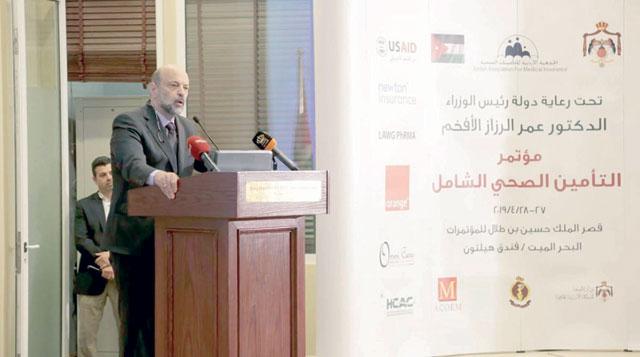You are here
JSF study sheds light on public healthcare services and insurance
By JT - Mar 15,2021 - Last updated at Mar 15,2021
AMMAN — The Jordan Strategy Forum (JSF) has issued a paper titled Enhancing the Competitiveness of the Health Sector in Jordan (Public Healthcare Services & Insurance) with the aim of examining the issues plaguing the effectiveness of Jordan's health sector and its sustainability.
Through its focus on health financing and health insurance, this paper argues that the main challenge facing the health sector in Jordan is not an inadequate level of resources, but rather, a misallocation of available resources, the JSF said in the paper, of which a copy was sent to The Jordan Times on Sunday.
Jordan spends between 8 per cent and 9 per cent of its GDP on health annually, significantly more than the averages of MENA countries and upper middle-income countries.
The Kingdom fares well in general health indicators, such as life expectancy, mortality rates, universal health coverage, and the global health security index, but performs worse in issues related to non-communicable diseases and the number of hospitals.
Jordanians are well covered under various insurance schemes, exemptions, and subsidized prices, which is reflected by a relatively low level of out-of-pocket expenditures standing at around 30.4 per cent of total health expenditures, according to the study.
According to the 2015 Census, 64 per cent of Jordanians are insured by at least one type of insurance, and 4.7 per cent receive free healthcare services.
The remaining Jordanians either pay subsidized prices at Health Ministry facilities (estimated at 20 per cent of cost) or receive exemptions of all healthcare fees associated with a certain condition. This means that every Jordanian receives a certain type of health coverage, under this intricate system, the JSF paper said.
However, this also means that multiple insurance schemes, along with a system of ad-hoc exemptions, and complicated subsidized pricing, makes the overall framework for health insurance and coverage fragmented and inefficient in its use of resources.
It also puts strain on the overall health budget, which has accumulated substantial arrears over the past decade, exceeding JD442 million by the end of 2017. This is even more relevant given the governance and management problems that each element of this system suffers from.
First of all, public insurance schemes are not actuarial-based, and a large share are insured on a non-contributory basis, which drains the overall health budget, especially in the absence of any oversight and accountability.
The existence of multiple public insurance schemes with varying levels of contributions and benefits further fragments the overall health insurance system.
Secondly, there has been evidence on the misuse of the exemptions programme, which embodies a discretionary decision-making system for the approval of exemption. In addition to contributing to the majority of health arrears, this system also acts as a disincentive for expanding health insurance coverage.
And thirdly, the subsidized prices, estimated to amount to 20 per cent of cost, have been frozen since the 1990s, and have therefore distorted the overall health services market in Jordan.
Overall, this complicated system has also allowed for numerous loopholes in the official health referral system through which patients can bypass the lower levels of care and go directly higher levels, even if they do not truly require it.
“The governance and management of the overall health sector lacks transparency and proper accountability, and there is poor integration among the main players in the sector,” the paper said.
Related Articles
AMMAN — The Jordan Strategy Forum on Saturday recommended the restructuring of the health insurance programme offered by the government, exe
AMMAN — Healthcare spending in the Kingdom is “wasteful” considering the unsatisfactory coverage and the fact that Jordan has a young popula
AMMAN — His Majesty King Abdullah on Sunday chaired a meeting at Basman Palace to follow up on the government’s measures to develop the heal













